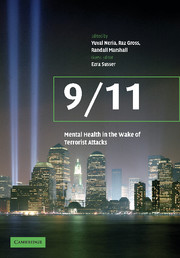Book contents
- Frontmatter
- Contents
- Acknowledgments
- Editors brief bio
- List of contributors
- Foreword
- Part I Introduction
- Part II The psychological aftermath of 9/11
- Part III Reducing the burden: community response and community recovery
- Part IV Outreach and intervention in the wake of terrorist attacks
- Part IV A New York area
- 16 PTSD in urban primary care patients following 9/11
- 17 Project Liberty: responding to mental health needs after the World Trade Center terrorist attacks
- 18 Mental health services support in response to September 11: the central role of the Mental Health Association of New York City
- 19 The New York Consortium for Effective Trauma Treatment
- 20 Evaluation and treatment of firefighters and utility workers following the World Trade Center attacks
- 21 The World Trade Center Worker/Volunteer Mental Health Screening Program
- 22 Child and adolescent trauma treatments and services after September 11: implementing evidence-based practices into complex child services systems
- 23 Relationally and developmentally focused interventions with young children and their caregivers in the wake of terrorism and other violent experiences
- Part IV B Washington, DC
- Part IV C Prolonged-exposure treatment as a core resource for clinicians in the community: dissemination of trauma knowledge post-disaster
- Part V Disasters and mental health: perspectives on response and preparedness
- Index
23 - Relationally and developmentally focused interventions with young children and their caregivers in the wake of terrorism and other violent experiences
from Part IV A - New York area
Published online by Cambridge University Press: 27 October 2009
- Frontmatter
- Contents
- Acknowledgments
- Editors brief bio
- List of contributors
- Foreword
- Part I Introduction
- Part II The psychological aftermath of 9/11
- Part III Reducing the burden: community response and community recovery
- Part IV Outreach and intervention in the wake of terrorist attacks
- Part IV A New York area
- 16 PTSD in urban primary care patients following 9/11
- 17 Project Liberty: responding to mental health needs after the World Trade Center terrorist attacks
- 18 Mental health services support in response to September 11: the central role of the Mental Health Association of New York City
- 19 The New York Consortium for Effective Trauma Treatment
- 20 Evaluation and treatment of firefighters and utility workers following the World Trade Center attacks
- 21 The World Trade Center Worker/Volunteer Mental Health Screening Program
- 22 Child and adolescent trauma treatments and services after September 11: implementing evidence-based practices into complex child services systems
- 23 Relationally and developmentally focused interventions with young children and their caregivers in the wake of terrorism and other violent experiences
- Part IV B Washington, DC
- Part IV C Prolonged-exposure treatment as a core resource for clinicians in the community: dissemination of trauma knowledge post-disaster
- Part V Disasters and mental health: perspectives on response and preparedness
- Index
Summary
Introduction
The terrorist attacks of September 11, 2001, made mental health professionals keenly aware of the need for relationally and developmentally focused interventions for traumatized young children and their families with greater urgency than ever before. Healthcare providers, educators, the media, and politicians were barraged by questions about parents who were concerned about the effects of this very public political violence on their young children,whether or not they were directly affected by the attacks.
Those young children who were directly affected by the attacks in New York or who witnessed the crashing of the two passenger planes into the World Trade Center (WTC) and the toppling of the Twin Towers were many in number: over 3000 children lost a parent, thousands of children attending schools and day-care centers near Ground Zero directly witnessed the attacks. Additionally, untold millions of children around the world watched the attacks repeatedly on TV. Children worldwide were reported to suffer from nightmares following the events of 9/11, and for weeks had difficulty concentrating in school (Hoven et al., 2003).
Historical overview of understanding trauma in a relational context
One of the most important observations which has informed our current relational view of child traumatic stress came from the study by Anna Freud and Dorothy Burlingham (1943). They noted the following during the London Blitz of World War II: “The war acquires comparatively little significance for children so long as it only threatens their lives, disturbs their material comfort, or cuts their food rations.
- Type
- Chapter
- Information
- 9/11: Mental Health in the Wake of Terrorist Attacks , pp. 402 - 424Publisher: Cambridge University PressPrint publication year: 2006



